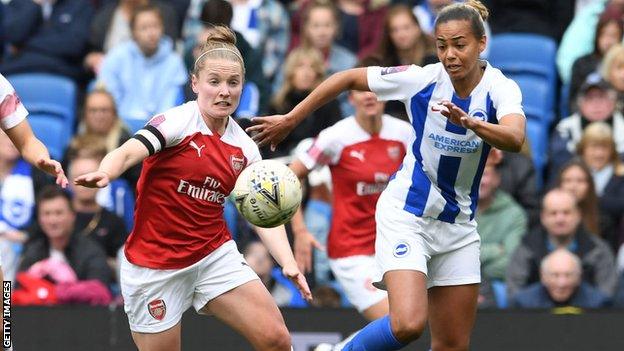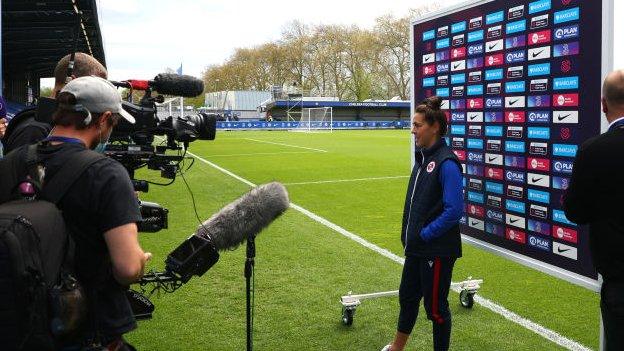Fern Whelan: PFA executive 'passionate about escalating women's football'
- Published

Fern Whelan (right) played for Brighton, Notts County, Liverpool and Everton during her long career
Former England international Fern Whelan wants to give women "the confidence to speak out" as part of her new role at the Professional Footballers' Association.
Whelan is the first executive for Equality, Diversity and Inclusion in women's football.
The former Everton, Liverpool, Notts County and Brighton defender retired last year following a 15-year career.
She hopes to tackle issues around player welfare and social media abuse.
"I'm learning quickly there's a lot to be done," Whelan told BBC Sport. "I'm really passionate about escalating women's football to where it needs to be - especially on the equality side.
"I want to make sure the WSL [Women's Super League] is at the top of its game in comparison to the men's side. Anything they get, we should get. That equality is massive."
'Players should have their voice'
As part of Whelan's new role, she hopes to speak to players - past and present - to provide a "platform" for if they want to talk about concerns within the game.
She says it is important "to promote cultures where it's OK to have a voice" and there needs to be education for players on how to report abuse.
The National Women's Soccer League (NWSL) in the US has been suspended this week after sexual misconduct allegations came to light - triggering investigations by US Soccer and Fifa.
"I think not just in the WSL but in plenty of organisations people are scared to speak up at times because of how it might affect them and their position within a club," said Whelan.
"It can be dressed up as changing room banter sometimes. It's all about education of what is right and wrong in terms of the wording and it's OK to speak up. It's more important than ever players should have their voice. Hopefully I can give players confidence that they can speak out without having any repercussions against them.
"They realise their voices are bigger and it's not just about them internally - they are affecting what's happening in the future of women's football and in the culture of every team within the WSL."
What can WSL clubs do to support players?

WSL games are being shown on Sky Sports and BBC network channels for the first time this season
The growth of women's football and the introduction of a new three-year broadcast deal means games are now shown on mainstream television but there are concerns over a rise in online and racial abuse.
Whelan says the "pressure" of becoming more accessible is something many female players "have never had to deal with before".
"They are not used to being in the public eye as much," she added. "On the mental health and wellbeing side of things, it's about educating the players on how to deal with any kind of online abuse, abuse within stadiums and how they report these situations.
"It's really important they don't just read it and think 'I'll come off social media'. It's about facing it head on and knowing where to report it so the right actions can take place.
"The other side is about looking after our players and their welfare which is massive. It can be quite worrying if we are not giving them the right tools and the right access for support."
Whelan says there should be "a basic standard" of player welfare support at every WSL club.
She also hopes players will follow in her footsteps and take on similar roles within the game at the end of their careers.
"Hopefully I can be a role model to players in that sense. They can see I'm a black female who has gone into an executive role and was playing football full-time - so it can be done.
"I hope for the future of women's football that females stay in the game when they exit rather than thinking there isn't opportunities for them."